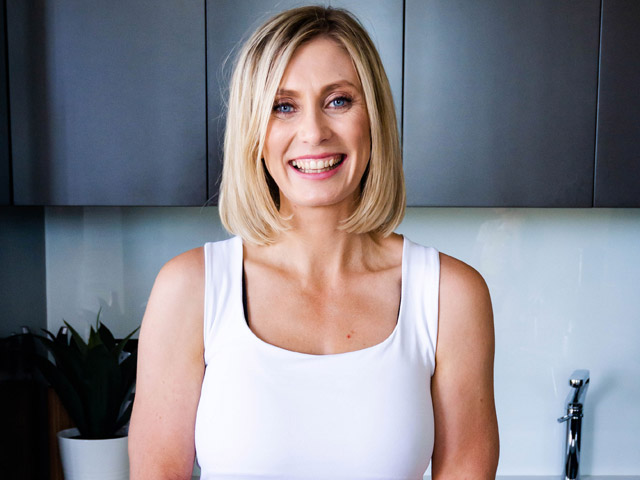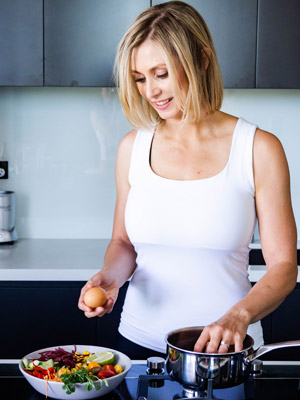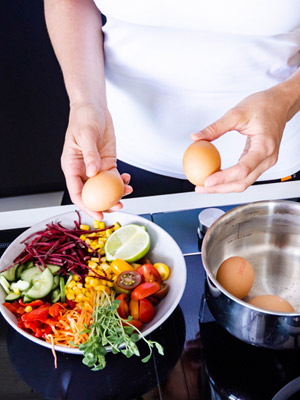Chloe McLeod The Link Between Food and Mood Interview

Interview with Chloe McLeod, Nutritionist and Gut Expert
Chloe is an expert in gut health, food intolerances and sports nutrition. With over 10 years' experience in the industry, Chloe's expert knowledge working with individuals, corporates and food industry provides a sought-after ability to help her clients be their healthiest selves. With a Bachelor of Nutrition and Dietetics at Flinders University and a Master of Public c at the University of Sydney, Chloe is passionate about helping individuals make positive changes to their lifestyle. Chloe has created a world class; online course, The FODMAP Challenge helping individuals identify gut intolerance symptoms, and is the lead author of the book 'Anti-Inflammatory Eating'.
As an Advanced Sports Dietitian and Accredited Practicing Dietitian, Chloe has worked with the Parramatta Eels National Rugby League squad, and previously Roxsalt Attaquer and Rabbitohs U20s squad, along with a number of international individual athletes to optimise their performance and create positive health changes.
Question: Can diet (poor or good) impact on stress levels?
Chloe McLeod: Good diet can help manage stress levels. We know having a healthy gut is linked with better mood and stress management, so choosing foods which help with growth of healthy bacteria will assist with this, and how the body feels day to day. This means including plenty of fibre rich foods, and foods rich in antioxidants and polyphenols.
Poor diet may make it more difficult to manage stress. If your body isn't feeling as healthy as it should, it may be more difficult to manage stress. Research has shown that low fibre, high fat diets can change your gut bacteria in as little as a few days!
If your diet is deficient in certain nutrients, such as choline or vitamin D you may notice worse stress levels. Both choline and vitamin D as both have been linked with better stress management and can be found in everyday household food items like eggs.
Question: Can diet choices help reduce stress?
Chloe McLeod: Diet can impact stress in a couple of ways:
Inclusion of carbohydrate rich foods. These are involved in serotonin production, the hormone that helps us feel happy. This is one of the reasons 'comfort food' is often carb heavy.
Ensuring adequate intake of the nutrients the body needs can help reduce stress. Firstly, by optimising performance through nutrient availability, creating an environment of less stress on the body by simply eating enough of the right foods each day can help with managing day to day stress. Secondly, by timing intake of food around stressors to help reduce impact of stress. For example, eating eggs and toast after a big training session provides protein, carbs and a number of micronutrients involved in better recovery.
Inclusion of foods which feed the microbiome. This means including fibre rich foods which provide food for the healthy bacteria in the gut. A healthy microbiome leads to less stress, due to the link between our gut and brain.
 Question: What are the best diet choices to help reduce stress?
Question: What are the best diet choices to help reduce stress?
Chloe McLeod: Include plenty of fibre rich foods, such as wholegrains and legumes. Ensure your plate is filled with a rainbow of colours to optimal nutrition. My favourite humble superfood are eggs, due to their fantastic nutrition profile for stress management – vitamin D, choline, protein and other B vitamins all have an important role to play. Happily, these foods work so well together. Think an omelette with avo, veggies and toast, or zucchini and rice slice, or even a chickpea salad with boiled eggs.
Question: What are the best diet choices for heart health?
Chloe McLeod: Include plenty of fibre rich foods, such as wholegrains and legumes. Ensure your plate is filled with a rainbow of colours to optimal nutrition! Include good quality protein, such as that you would consume from eggs and healthy fats, such as from fish, avocado, olive oil or walnuts.
Question: Can stress impact heart health? Can this be mitigated via food choices?
Chloe McLeod: Yes, stress can impact heart health. Many of us will know someone or heard stories of individuals under significant stress who go on to have a heart attack. Chronic stress exposes your body to unhealthy, persistently elevated levels of stress hormones like adrenaline and cortisol. This is then linked to the way the blood clots and can increase risk of a heart attack.
Some people make poorer food choices when they are stressed or increase the quantity of alcohol they'd usually consume. By following a nutrient dense diet this can help mitigate risk. This means including nutrient dense protein sources, such as eggs, along with plenty of plant-based foods for fibre, micronutrients and healthy fats.
Question: When young adults start managing their own diets for the first time (because they've left home or are now working full time) what are some tips they should consider?
Chloe McLeod: Health impact of food choices – yes can be tempting to live on take away, however this won't leave you feeling your best self for long. Better food choices result in better health, which means improved quality of life for the long term.
Budget – For most when they move out of home, budget is something to consider. Choosing good quality food that doesn't break the bank is important. Making use of eggs, be it as an omelette, scrambled eggs or something else, is a wallet friendly option for getting in enough good quality protein.
Learn to cook. Having 2-3 go to, easy meals you can cook on a weeknight, along with 1 meal that requires a little more effort is a great start from both a week to week basis, and if you are wanting to cook for someone in your new abode.
Question: Can you tell us what role eggs play in a stress reducing diet?
Chloe McLeod: Eggs are a great source of good quality protein which help with managing satiety levels. Eggs also contain choline, a nutrient that's needed to produce acetylcholine, a neurotransmitter that impacts the portions of the brain responsible for regulating mood and reducing stress. Plus - eggs are a great source of vitamin D, and it's been shown that adequate vitamin D levels have been linked with reduced risk of depression.
Question: What about eggs and a healthy heart?
Chloe McLeod: Eggs help increase levels of high-density lipoprotein (HDL), or "good" cholesterol as it's commonly known. Higher levels of HDL can help reduce the risk of heart disease. It's low-density lipoprotein (LDL), or "bad" cholesterol, that can put heart health at risk.
The cholesterol eggs contain is not a problem in most cases as it is difficult to absorb; there is no relationship between eating eggs and increased risk of heart disease.
 Question: Can you please give one (mood/health) benefit for each of the following vitamins/nutrients that are found in eggs?
Question: Can you please give one (mood/health) benefit for each of the following vitamins/nutrients that are found in eggs?
Chloe McLeod: Vitamin B – helps body manage stress more effectively. Vitamins B1,2,3,6 and 12 all help the nervous system function more effectively, which in turn help with stress management.
Vitamin D – adequate levels shown to reduce risk of depression
Choline – a nutrient that's needed to produce acetylcholine, a neurotransmitter that impacts the portions of the brain responsible for regulating mood and reducing stress.
Tryptophan – helps with sleep. It is involved in the making of melatonin, which is the hormone which helps influences your sleep/wake cycle.
Question: What are your top 5 tips for people wanted to create healthy diets for their busy schedules?
Chloe McLeod: Be organised. Planning ahead, stocking your pantry and freezer with healthy options, and knowing what you will eat when makes it much simpler as it means less decision making on the fly, and ensures the healthy choice is the easy choice.
Meal prep. Similar to being organised, prepping your meals 1-2 times per week means less time spent cooking, resulting in more time for other activities, be it work or play.
Hydrate. Keep a bottle of water with you to sip on across the day, refilling as needed. This helps prevent unnecessary snacking (as common side effect of dehydration), and also helps improve concentration.
Include a nutritious, balanced lunch. 3pm is the common time people head to the chocolate jar, however this doesn't need to be you. Choose a meal that is balanced with good quality protein, low GI carbs and loads of veggies to help you feel satisfied but not heavy and avoid reaching for that 3pm chocolate.
Use online shopping. Getting to the shops, shopping, and getting home from the shops can be time consuming. Create a couple of lists in your preferred online store for your weekly essentials and have them delivered each week.
As an Advanced Sports Dietitian and Accredited Practicing Dietitian, Chloe has worked with the Parramatta Eels National Rugby League squad, and previously Roxsalt Attaquer and Rabbitohs U20s squad, along with a number of international individual athletes to optimise their performance and create positive health changes.
Question: Can diet (poor or good) impact on stress levels?
Chloe McLeod: Good diet can help manage stress levels. We know having a healthy gut is linked with better mood and stress management, so choosing foods which help with growth of healthy bacteria will assist with this, and how the body feels day to day. This means including plenty of fibre rich foods, and foods rich in antioxidants and polyphenols.
Poor diet may make it more difficult to manage stress. If your body isn't feeling as healthy as it should, it may be more difficult to manage stress. Research has shown that low fibre, high fat diets can change your gut bacteria in as little as a few days!
If your diet is deficient in certain nutrients, such as choline or vitamin D you may notice worse stress levels. Both choline and vitamin D as both have been linked with better stress management and can be found in everyday household food items like eggs.
Question: Can diet choices help reduce stress?
Chloe McLeod: Diet can impact stress in a couple of ways:
Inclusion of carbohydrate rich foods. These are involved in serotonin production, the hormone that helps us feel happy. This is one of the reasons 'comfort food' is often carb heavy.
Ensuring adequate intake of the nutrients the body needs can help reduce stress. Firstly, by optimising performance through nutrient availability, creating an environment of less stress on the body by simply eating enough of the right foods each day can help with managing day to day stress. Secondly, by timing intake of food around stressors to help reduce impact of stress. For example, eating eggs and toast after a big training session provides protein, carbs and a number of micronutrients involved in better recovery.
Inclusion of foods which feed the microbiome. This means including fibre rich foods which provide food for the healthy bacteria in the gut. A healthy microbiome leads to less stress, due to the link between our gut and brain.
 Question: What are the best diet choices to help reduce stress?
Question: What are the best diet choices to help reduce stress? Chloe McLeod: Include plenty of fibre rich foods, such as wholegrains and legumes. Ensure your plate is filled with a rainbow of colours to optimal nutrition. My favourite humble superfood are eggs, due to their fantastic nutrition profile for stress management – vitamin D, choline, protein and other B vitamins all have an important role to play. Happily, these foods work so well together. Think an omelette with avo, veggies and toast, or zucchini and rice slice, or even a chickpea salad with boiled eggs.
Question: What are the best diet choices for heart health?
Chloe McLeod: Include plenty of fibre rich foods, such as wholegrains and legumes. Ensure your plate is filled with a rainbow of colours to optimal nutrition! Include good quality protein, such as that you would consume from eggs and healthy fats, such as from fish, avocado, olive oil or walnuts.
Question: Can stress impact heart health? Can this be mitigated via food choices?
Chloe McLeod: Yes, stress can impact heart health. Many of us will know someone or heard stories of individuals under significant stress who go on to have a heart attack. Chronic stress exposes your body to unhealthy, persistently elevated levels of stress hormones like adrenaline and cortisol. This is then linked to the way the blood clots and can increase risk of a heart attack.
Some people make poorer food choices when they are stressed or increase the quantity of alcohol they'd usually consume. By following a nutrient dense diet this can help mitigate risk. This means including nutrient dense protein sources, such as eggs, along with plenty of plant-based foods for fibre, micronutrients and healthy fats.
Question: When young adults start managing their own diets for the first time (because they've left home or are now working full time) what are some tips they should consider?
Chloe McLeod: Health impact of food choices – yes can be tempting to live on take away, however this won't leave you feeling your best self for long. Better food choices result in better health, which means improved quality of life for the long term.
Budget – For most when they move out of home, budget is something to consider. Choosing good quality food that doesn't break the bank is important. Making use of eggs, be it as an omelette, scrambled eggs or something else, is a wallet friendly option for getting in enough good quality protein.
Learn to cook. Having 2-3 go to, easy meals you can cook on a weeknight, along with 1 meal that requires a little more effort is a great start from both a week to week basis, and if you are wanting to cook for someone in your new abode.
Question: Can you tell us what role eggs play in a stress reducing diet?
Chloe McLeod: Eggs are a great source of good quality protein which help with managing satiety levels. Eggs also contain choline, a nutrient that's needed to produce acetylcholine, a neurotransmitter that impacts the portions of the brain responsible for regulating mood and reducing stress. Plus - eggs are a great source of vitamin D, and it's been shown that adequate vitamin D levels have been linked with reduced risk of depression.
Question: What about eggs and a healthy heart?
Chloe McLeod: Eggs help increase levels of high-density lipoprotein (HDL), or "good" cholesterol as it's commonly known. Higher levels of HDL can help reduce the risk of heart disease. It's low-density lipoprotein (LDL), or "bad" cholesterol, that can put heart health at risk.
The cholesterol eggs contain is not a problem in most cases as it is difficult to absorb; there is no relationship between eating eggs and increased risk of heart disease.
 Question: Can you please give one (mood/health) benefit for each of the following vitamins/nutrients that are found in eggs?
Question: Can you please give one (mood/health) benefit for each of the following vitamins/nutrients that are found in eggs? Chloe McLeod: Vitamin B – helps body manage stress more effectively. Vitamins B1,2,3,6 and 12 all help the nervous system function more effectively, which in turn help with stress management.
Vitamin D – adequate levels shown to reduce risk of depression
Choline – a nutrient that's needed to produce acetylcholine, a neurotransmitter that impacts the portions of the brain responsible for regulating mood and reducing stress.
Tryptophan – helps with sleep. It is involved in the making of melatonin, which is the hormone which helps influences your sleep/wake cycle.
Question: What are your top 5 tips for people wanted to create healthy diets for their busy schedules?
Chloe McLeod: Be organised. Planning ahead, stocking your pantry and freezer with healthy options, and knowing what you will eat when makes it much simpler as it means less decision making on the fly, and ensures the healthy choice is the easy choice.
Meal prep. Similar to being organised, prepping your meals 1-2 times per week means less time spent cooking, resulting in more time for other activities, be it work or play.
Hydrate. Keep a bottle of water with you to sip on across the day, refilling as needed. This helps prevent unnecessary snacking (as common side effect of dehydration), and also helps improve concentration.
Include a nutritious, balanced lunch. 3pm is the common time people head to the chocolate jar, however this doesn't need to be you. Choose a meal that is balanced with good quality protein, low GI carbs and loads of veggies to help you feel satisfied but not heavy and avoid reaching for that 3pm chocolate.
Use online shopping. Getting to the shops, shopping, and getting home from the shops can be time consuming. Create a couple of lists in your preferred online store for your weekly essentials and have them delivered each week.
MORE



